THE ONE ARMED SWORDSMAN (1967)
Working towards a goal can be very motivating if you really want to see the outcome and feel the benefits from your achievements. Work hard enough and one day your dreams will become a reality and you’ll be able to get to a level of expertise that you never thought was possible. Some people are naturally talented so the things they work towards seem easy whereas other people take years to master things because their will to do the thing that they love is stronger than their inherent ability. Others may laugh at a person or deliberately try and stop them doing what they want because they think they’re either not good enough, will never achieve what they want or they may even be secretly jealous. There may even be a time where something may happen to a person which stops their hard work so they cannot continue and this is what really tests the determination of the human spirit. A person can either decide to give up, try something new or find a new way to continue doing the thing they love the most.
Fang Kang’s (Yu ‘Jimmy’ Wang) father dies when he is young whilst trying to protect his master, Qi Ru Feng (Feng Tien), his final wish is that Fang Kang is taken in by master Qi and taught everything his father was taught so he can be an expert martial artist. Years later, Fang Kang is working alongside his master’s other disciples and master Qi decides that Fang Kang will be his successor as he is the most skilled of his students and even though he has a daughter, Chi Pei-erh (Yin-Tze ‘Angela’ Pan) he knows that she is too headstrong to be the right leader to put in his place once he has gone. Fang Kang doesn’t get along with his fellow students, they treat him like a servant rather than an equal just because he is an orphan so when he learns that master Qi is looking to him as his replacement he leaves the martial arts school thinking that his appointment will only cause trouble among the other students.
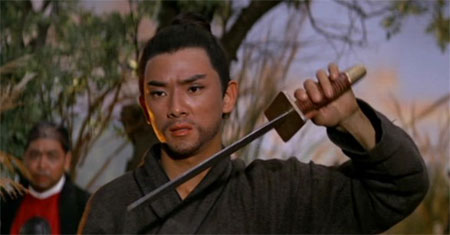
Soon the others learn of his disappearance and go after him to confront him. Chi Pei-erh is particularly hurt because she thinks Fang Kang is too cold towards her and resents him for it. Once the students catch up with him an altercation ensues and Chi Pei-erh cuts off Fang Kang’s right arm. Clearly hurt and now frightened, Fang Kang makes his escape and ends up falling into a passing boat owned by a peasant girl, Hsiao Man (‘Lisa’ Chiao Chiao) who nurses him back to health.
The One-Armed Swordsman is a unique film that started a new wave in Chinese cinema and whose influence can be seen even to this day in characters such as Ash Williams from the Evil Dead franchise and Luke Skywalker. It became the first film to gross one million Hong Kong dollars, two sequels and a reboot and became a staple of martial arts cinema from which many other films would pull their influence. ‘Jimmy’ Wang and director Cheh Chang became stars overnight, Chang would go on to direct nearly 100 films and would gain the title ‘The Godfather of Hong Kong cinema’. Wang would go on to be China’s biggest star until Bruce Lee came along, starring in many of the best films from Hong Kong and still acts today.
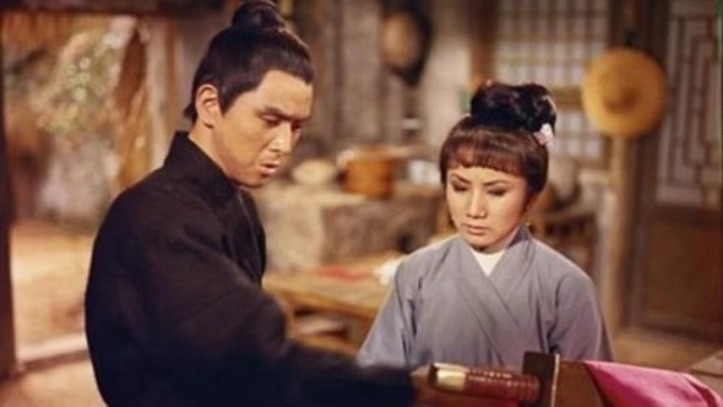
The story of a man struck down in his prime only to come back to defeat his enemies and win the day even when he thought all hope was lost due to his disability must have struck a chord with audiences. Since the release of the film, the theme of disabled heroes runs through Hong Kong cinema from blind ninjas to a film called Crippled Avengers (see my review here) which showed many different disabled people working together to fight as the film’s protagonists. There have been criticisms from some that these stories highlight disabled people’s achievements in life, making them out to be superhuman merely because when one ability is taken away they can still do extraordinary things. However, whereas these criticisms are valid when taking the clichés on as a whole, taking these examples on a case by case basis there may be a little more to the characters and what they go through.
Fang Kang, now injured beyond repair and fearing for his future is trying to decide what to do with his life. Hsiao Man is trying to dissuade him from a life of violence and vengeance in the name of honour but Fang Kang’s will to carry on with his training is too strong. Hsiao Man realises his determination and gives him a martial arts manual that her father learnt from in order to become a skilled martial artist. The techniques in the book teach Fang Kang to use only one arm when fighting and so after a lot of study, Fang Kang soon finds himself an expert and ready to take on those who oppose master Qi’s school.
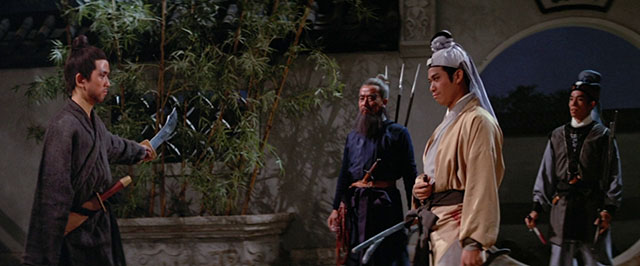
Fang Kang’s character is well thought out and when he is injured there would be a temptation for him to just suddenly apply what he learnt to his new situation without any issues but the film runs a little deeper than that. Fang Kang is seen worrying about how he will continue doing the thing he loved as I’m sure anybody would when faced with that situation but he also looks at what he can do with his life. He deals with his disability as a way to explore new things, not look back at the thing he lost but to look forward at new opportunities. There may have also been a temptation to give him a new arm as the villain in Crippled Avengers has but the filmmakers wanted to tell the story of the man’s recovery and I think it succeeds in showing the audience that life doesn’t stop once disability enters a person’s life.
The cast are all what you would expect from a typical Chinese martial arts film of that era. From its stoic hero and its villain, Smiling Tiger Tian Shou (Ti Tang) who as you would imagine finds it hard to stop laughing even at the most inappropriate moments, it is your typical over the top action film. The absurdness of some of the characters and their eccentric uses of various weapons may seem too far-fetched for some but it all adds to the fun and its protagonist somehow stays serious and unaffected by the escalations of danger that he faces thus making him an icon of Chinese cinema and a hero to all. From here on, The Shaw Brothers would stick to their style of violence coupled with traditional settings and characters taken from China’s own history. Their time during the sixties and seventies was the kind of success that would never be seen again but the genre stays strong in the hearts and minds of martial arts fans the world over. Who knew that it would all start with a hero that other filmmakers may have not even considered?
RETURN OF THE ONE-ARMED SWORDSMAN (1969)
Sequels are quite often terrible. Usually they are given very little thought, even less budget than the first film and sometimes even some of the original cast are missing or replaced causing confusion for those fans in the audience expecting something new but at the same time something familiar. It’s common knowledge that sequels are rarely as good as the first film but time and time again cinema has shown that even though audiences are aware of this fact they still pay money to see the next instalment.
These days it seems that sequels are big businesses but film studios prefer to call them ‘franchises’. The filmmakers take all or some of the original cast and put them in new locations with new challenges and new enemies to defeat. Franchises also used to be trilogies, an audience would usually expect certain film series to end after the third one and if they were lucky there would be a dramatic climax to the trilogy’s continuing story that would tie up any loose ends and leave an audience satisfied – although that is very rare. There have, however, been some franchises that never seem to stop and it may be because of the love of the characters and the storylines which enthral audiences, sometimes bringing in new fans along the way but more often than not it’s because the film studios want to make more money. Franchises such as Fast and Furious, Pirates of The Caribbean and Transformers are big money spinners and even though they pretend to be a continuing story in the lives of these beloved characters of the silver screen, by the time of the fourth or fifth instalment most of the original cast have left the franchise. Even the filmmakers have forgotten what made the original so appealing but occasionally, some franchises know when to quit while they’re ahead.
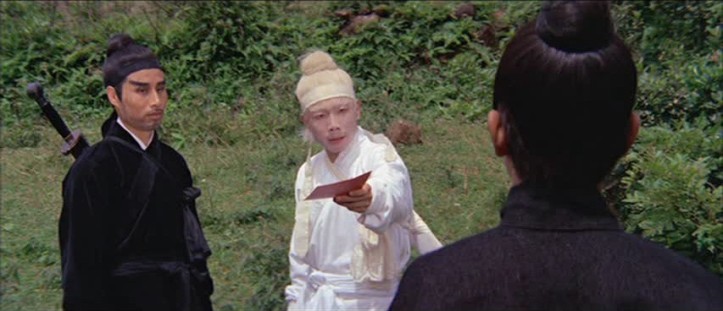
After the events of the first film, Fang Gang’s (Yu ‘Jimmy Wang) life has changed forever – his last name has even changed. After being trained and rejected by his dojo resulting in the loss of one of his arms, he found a new life and love with his wife Hsiao Man (‘Lisa’ Chiao Chiao). Having given up his martial arts training and lifestyle, Fang Gang lives the simple life of a farmer, but soon he will be reluctantly pulled back into the world of sword fighting that caused him so much trouble.
Return of The One-Armed Swordsman marks the return of (you guessed it) the famous one-armed swordsman, Fang Gang and writer/director Cheh Chang. Having had major success with the first film it was inevitable that there could be a sequel on the horizon although the right story had to be found and Chang surely didn’t want to repeat the first film’s plot just to bring in an audience. After being found by two men known as the Black and White Swordsmen (Yeh Fang and Wu Ma respectively) they hand Fang Gang an invitation to a tournament held by The Eight Kings who are determined to overthrow the martial arts community at any cost. Reluctant at first, Fang Gang talks it over with his wife but they soon hear of people being killed for refusing to take part in the tournament so Fang Gang sets out to investigate.
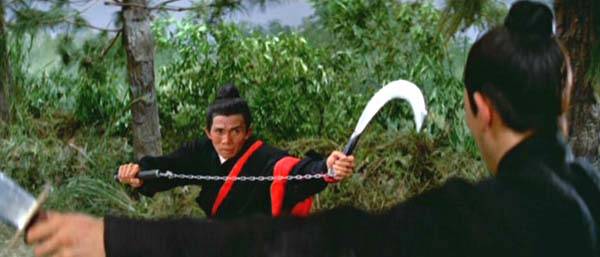
Now a revered swordsman, the students from the various dojos around China are calling for Fang Gang’s help so that he can bring balance to their lives once again and defeat The Eight Kings. As their grip grows ever tighter, The Eight Kings have kidnapped the masters of the dojos and are holding them to ransom. Either the students cut off one of their own arms as a sacrifice or their masters will die so Fang Gang realises that the situation has escalated and it’s about to get personal when Fang Gang learns that his wife has been kidnapped.
For a sequel, Return of The One-Armed Swordsman seems like an almost natural progression of our hero, Fang Gang’s story. Here he is seen living a reclusive life with his wife and is reluctant to go back to his violent ways to stay with the woman he loved. This trope would go on to be used in many different films but at the time it would have felt fresh and realistic and also add to the story rather than just having Fang Gang leap back into action at the drop of a hat. Part of the appeal of the first film was Fang Gang’s fall and rise to triumph over evil so rehashing the same kind of story again would feel repetitive and unoriginal so the audience are made to wait for Fang Gang’s return to make it all the more exciting when he does. That said, I feel that Fang Gang’s return loses some of the depth and escalation that made the first film so successful. This being a sequel, the audience know that their hero will fight once again (the title kind of gives it away) so the prolonged wait although adding to the story only lengthens out quite a simplistic plot. This time Fang Gang is faced with a lot more adversaries than before but unfortunately, more doesn’t mean better. The Eight Kings are set up as figureheads in the evil organisation but do very little to show their prowess as villains leaving most of the fighting to various minions (highly trained stuntmen) to do all the work for them. There are featured villains such as the black and white swordsmen and femme fatale ‘Thousand Fingers’ Hua Niang (Chia Essie Lin) but they despite their flair and appeal they are dealt with fairly quickly and easily leaving Fang Gang’s final fight to mainly consist of the many stuntmen and extras trained in martial arts.
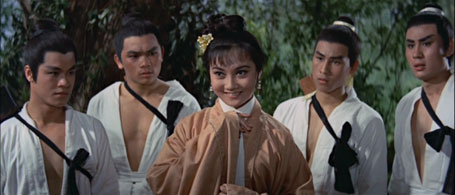
Fang Gang is most notably the hero of the story and is honoured in this way by both the cast and the audience. There are no moments where his disability holds him back nor are there moments that highlight his disability to heighten the peril of his situation. His reputation as a hero leaves his followers in awe telling the audience that he is the best in his field and nobody even notices how he does it all with one arm – and better. It’s a shame that more films don’t have disabled heroes in them and this film and its predecessor shows that it could be easily done with an actor that is a real amputee. That saying, the franchise all but stopped at this point although these films show what could have been it could have been much more popular as martial arts films were just about to get much bigger.
Coming soon… The New One Armed Swordsman (don’t get me started on reboots, that’s for another post).